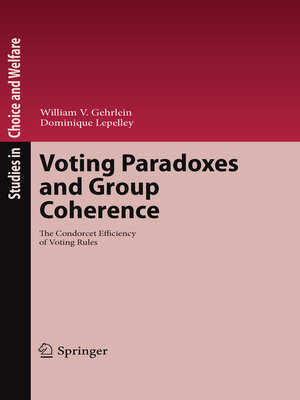Voting Paradoxes and Group Coherence
ebook ∣ The Condorcet Efficiency of Voting Rules · Studies in Choice and Welfare
By William V. Gehrlein

Sign up to save your library
With an OverDrive account, you can save your favorite libraries for at-a-glance information about availability. Find out more about OverDrive accounts.
Find this title in Libby, the library reading app by OverDrive.



Search for a digital library with this title
Title found at these libraries:
| Library Name | Distance |
|---|---|
| Loading... |
The likelihood of observing Condorcet's Paradox is known to be very low for elections with a small number of candidates if voters' preferences on candidates reflect any significant degree of a number of different measures of mutual coherence. This reinforces the intuitive notion that strange election outcomes should become less likely as voters' preferences become more mutually coherent. Similar analysis is used here to indicate that this notion is valid for most, but not all, other voting paradoxes. This study also focuses on the Condorcet Criterion, which states that the pairwise majority rule winner should be chosen as the election winner, if one exists. Representations for the Condorcet Efficiency of the most common voting rules are obtained here as a function of various measures of the degree of mutual coherence of voters' preferences. An analysis of the Condorcet Efficiency representations that are obtained yields strong support for using Borda Rule.







